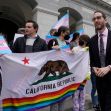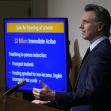California lawmakers have approved a guaranteed income program that will provide qualified residents a guaranteed monthly income with no strings attached. The program will prioritize individuals who have aged out of the foster care system as well as pregnant mothers.
Universal basic income and guaranteed income programs have been a topic of conversation for decades. Reverend Martin Luther King Jr. was the first to really give the idea breath, and such programs were later described as a “social vaccine for the 21st century” by Silicon Valley. However, it wasn’t until just recently that these programs found their footing again. During the 2016 presidential election when popular presidential candidate Andrew Yang vocalized his support for such a program, acceptance of them became widespread, especially among young individuals who were strapped with crippling student loan debt.
California Allocates $35 Million
Last Thursday, California lawmakers gave the green light to a bill that would fund cities and counties that had guaranteed income programs in place. The bill will allocate $35 million to programs that offer guaranteed income to qualified residents.
This landmark bill would be the nation’s first program that provides taxpayer funding to qualified applicants. Currently, the money will be prioritized to qualifying pregnant mothers and foster youth who have left the foster care system. The monthly payments will range anywhere between $500 and $1000 a month. It’s not yet clear how qualified individuals will be selected, but it will likely be done through a lottery system.
As the nation emerges from the pandemic, lawmakers and advocates of guaranteed income programs explain that the pandemic highlighted the growing disparity between the rich and the poor. Los Angeles County Supervisor and member of Mayors for Guaranteed Income, Holly Mitchell, explained that the pandemic “took the blinders off of what it means to live on the margins.”
State Senator Dave Cortese was the first to initiate a basic income program in Santa Clara County. His program was privately funded and also targeted individuals who were leaving the foster care system after aging out. Cortese said of the program that the no strings attached approach is a very stark difference from traditional government aid programs that require specific spending. “It really had a mentality of ‘we know what’s best for you weaker, poorer people,’” Cortese explained of previous government benefit programs.
In another high-profile universal basic income program titled SEED or the Stockton Economic Empowerment Demonstration, the results were deemed an overall success after its first two years. The mayor at the time, Michael Tubbs, founded the program which was funded by private donors and offered $500 to 125 randomly selected individuals with no strings attached. The participants who were selected had to meet certain requirements including living in a Stockton neighborhood and making less than the median annual income. The results showed that there was a rise in individuals obtaining full-time jobs than there was with individuals who did not receive the money. Participants also shared that they had an overall improvement in their health and happiness.
The SEED program helped fuel similar pilot programs across the state. Local efforts in Oakland, Marin County, San Francisco, and Santa Clara County all have some sort of program in place that will test the feasibility of a guaranteed income program.
Opposition to Guaranteed Income Program Warns of Laziness
Opponents of such programs continue to argue that guaranteed income programs will only fuel an individual’s lack of securing work. Many liken such programs to unemployment benefits that get misused because they incentivize an individual not to go out and find employment. Popular political commentator Ben Shapiro is one of the most outspoken individuals against guaranteed income programs. In an interview with top podcaster Joe Rogan, Shapiro argued that a guaranteed income would cause people to rely heavily on the government and that individuals could not be trusted with government “handouts” especially in programs like these where the money is given with no strings attached.
Although many critics might support Shapiro’s stance, the California measure appears to have widespread backing behind it as the bill passed with unanimous bipartisan support. Following the bill’s success, Senate Republican leader Scott Wilk shared, “If you look at the stats for our foster youth, they are devastating.” Wilk added, “We should be doing all we can to lift these young people up.”






